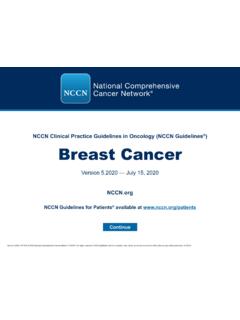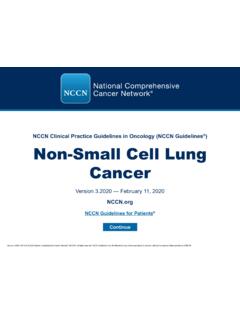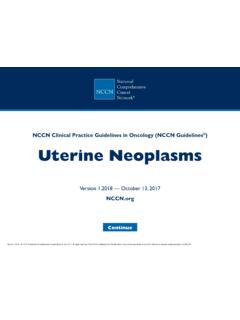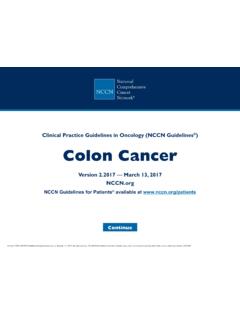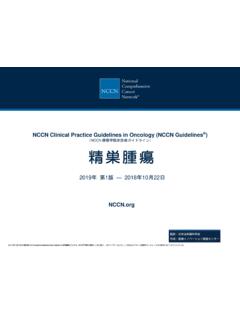Transcription of NCCN Clinical Practice Guidelines in Oncology (NCCN ...
1 NCCN Clinical Practice Guidelines in Oncology (NCCN Guidelines )Ovarian CancerIncluding Fallopian Tube Cancerand Primary Peritoneal CancerVersion November 9, , 11/09/17 National Comprehensive Cancer Network, Inc. 2017, All rights reserved. The NCCN Guidelines and this illustration may not be reproduced in any form without the express written permission of NCCN . NCCN Guidelines for Patients available at Guidelines IndexOvarian Cancer TOCD iscussionVersion , 11/09/17 National Comprehensive Cancer Network, Inc. 2017, All rights reserved. The NCCN Guidelines and this illustration may not be reproduced in any form without the express written permission of NCCN.
2 NCCN Guidelines Version Panel Members Ovarian Cancer**Deborah K. Armstrong, MD/Chair The Sidney Kimmel ComprehensiveCancer Center at Johns HopkinsSteven C. Plaxe, MD/Vice Chair UC San Diego Moores Cancer CenterRonald D. Alvarez, MD Vanderbilt-Ingram Cancer CenterJamie N. Bakkum-Gamez, MD Mayo Clinic Cancer CenterLisa Barroilhet, MD University of Wisconsin Carbone Cancer CenterKian Behbakht, MD University of Colorado Cancer CenterLee-may Chen, MD UCSF Helen Diller FamilyComprehensive Cancer CenterMarta Ann Crispens, MD Vanderbilt-Ingram Cancer CenterMihaela Cristea, MD City of Hope Comprehensive Cancer CenterMaria DeRosa, RN Oliver Dorigo, MD, PhD Stanford Cancer InstituteDavid M.
3 Gershenson, MD The University of TexasMD Anderson Cancer CenterHeidi J. Gray, MD University of Washington Medical Center/ Seattle Cancer Care AllianceArdeshir Hakam, MD Moffitt Cancer CenterLaura J. Havrilesky, MD Duke Cancer InstituteCarolyn Johnston, MD University of Michigan Comprehensive Cancer CenterMonica B. Jones, MD Duke Cancer InstituteCharles A. Leath III, MD University of Alabama at BirminghamComprehensive Cancer CenterShashikant Lele, MD Roswell Park Cancer InstituteLainie Martin, MD Fox Chase Cancer CenterUrsula A. Matulonis, MD Dana-Farber/Brigham andWomen s Cancer Center David M. O Malley, MD The Ohio State University Comprehensive Cancer Center - James Cancer Hospital and Solove Research InstituteRichard T.
4 Penson, MD, MRCP Massachusetts General HospitalCancer CenterSanja Percac-Lima, MD Massachusetts General HospitalCancer CenterMario Pineda, MD, PhD Robert H. Lurie Comprehensive Cancer Center of Northwestern UniversityMatthew A. Powell, MD Siteman Cancer Center at Barnes-Jewish Hospital and Washington University School of MedicineElena Ratner, MD Yale Cancer Center/Smilow Cancer HospitalSteven W. Remmenga, MD Fred & Pamela Buffett Cancer CenterPeter G. Rose, MD Case Comprehensive Cancer Center/University Hospitals Seidman Cancer Center and Cleveland Clinic Taussig Cancer InstitutePaul Sabbatini, MD Memorial Sloan Kettering Cancer CenterJoseph T.
5 Santoso, MD St. Jude Children s Research Hospital/ University of Tennessee Health Science CenterShohreh Shahabi, MD Robert H. Lurie Comprehensive Cancer Center of Northwestern UniversityTheresa L. Werner, MD Huntsman Cancer Institute at the University of UtahNCCNJ ennifer BurnsMiranda Hughes, PhDNCCN Guidelines Panel Disclosures Gynecology Oncology Hematology/Hematology Oncology Medical Oncology Internal medicine Pathology Patient advocacy* Discussion writing committee memberContinueClinical Trials: NCCN believes that the best management for any patient with cancer is in a Clinical trial. Participation in Clinical trials is especially encouraged.
6 To find Clinical trials online at NCCN Member Institutions, click here: Categories of Evidence and Consensus: All recommendations are category 2A unless otherwise indicated. See NCCN Categories of Evidence and Ovarian Cancer Panel MembersSummary of the Guidelines UpdatesEpithelial Ovarian Cancer/Fallopian Tube Cancer/Primary Peritoneal Cancer: Clinical Presentation, Workup, Clinical Stage, Primary Treatment (OV-1)Diagnosis by Previous Surgery: Findings and Primary Treatment (OV-2)Pathologic Staging, Primary Chemotherapy/Primary Adjuvant Therapy (OV-3)Post-Primary Treatment: Secondary Adjuvant Therapy (OV-4)Monitoring/Follow-Up, Recurrent Disease (OV-5)Disease Status, Therapy for Persistent Disease or Recurrence (OV-6)Less Common Ovarian Histopathologies.
7 Diagnosis (LCOH-1)Carcinosarcoma (Malignant Mixed M llerian Tumors) (LCOH-2)Clear Cell Carcinoma (LCOH-3)Mucinous Carcinoma (LCOH-4)Low-Grade (Grade 1) Serous/Endometrioid Epithelial Carcinoma (LCOH-5)Borderline Epithelial Tumors (Low Malignant Potential) (LCOH-6)Malignant Sex Cord-Stromal Tumors (LCOH-9)Malignant Germ Cell Tumors (LCOH-10)Surveillance for Malignant Germ Cell and Sex Cord-Stromal Tumors (LCOH-12)Principles of Surgery (OV-A)Principles of Systemic Therapy (OV-B) Primary Systemic Therapy Regimens (OV-B, 3 of 8) Acceptable Recurrence Therapies (OV-B, 5 of 8)Management of Drug Reactions (OV-C)WHO Histologic Classification (OV-D)The NCCN Guidelines are a statement of evidence and consensus of the authors regarding their views of currently accepted approaches to treatment.
8 Any clinician seeking to apply or consult the NCCN Guidelines is expected to use independent medical judgment in the context of individual Clinical circumstances to determine any patient s care or treatment. The National Comprehensive Cancer Network (NCCN ) makes no representations or warranties of any kind regarding their content, use or application and disclaims any responsibility for their application or use in any way. The NCCN Guidelines are copyrighted by National Comprehensive Cancer Network . All rights reserved. The NCCN Guidelines and the illustrations herein may not be reproduced in any form without the express written permission of NCCN. , 11/09/17 National Comprehensive Cancer Network, Inc.
9 2017, All rights reserved. The NCCN Guidelines and this illustration may not be reproduced in any form without the express written permission of NCCN . NCCN Guidelines Version Table of ContentsOvarian CancerStaging (ST-1)NCCN Guidelines for Patients are available at Guidelines IndexOvarian Cancer TOCD iscussionVersion , 11/09/17 National Comprehensive Cancer Network, Inc. 2017, All rights reserved. The NCCN Guidelines and this illustration may not be reproduced in any form without the express written permission of NCCN . UPDATESNCCN Guidelines Version UpdatesOvarian CancerUpdates in Version of the NCCN Guidelines for Ovarian Cancer from Version include:NCCN Guidelines IndexOvarian Cancer TOCD iscussionContinued on next pageOV-B (5 of 8)/(6 of 8) Footnote"i" revised: "In general, the panel would recommend combination regimens, platinum-based regimens for platinum-sensitive recurrent disease based on randomized trial data, especially in first relapses.
10 " Footnote "k" revised: In patients who have not previously received bevacizumab. There are limited data on the efficacy of bevacizumab in the recurrence therapy setting for patients previously treated with bevacizumab. Footnote "m" added: "If response after chemotherapy, bevacizumab can be continued as maintenance therapy until disease progression or unacceptable toxicity."OV-6 After platinum-based recurrence therapy for platinum-sensitive disease: Olaparib was added as a maintenance therapy option: "Consider niraparib or olaparib maintenance therapy if partial or complete response." Footnote "aa" added to olaparib: "For those with platinum-sensitive disease who have completed two or more lines of platinum-based therapy.

